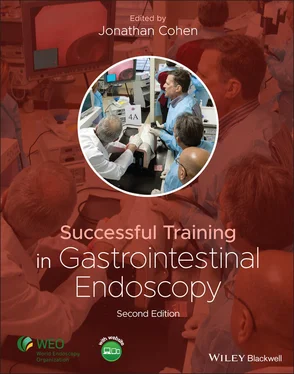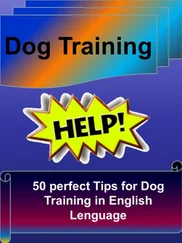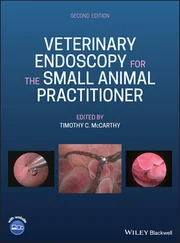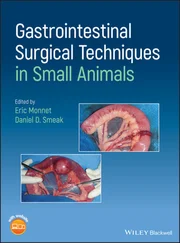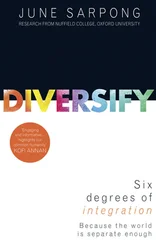Successful Training in Gastrointestinal Endoscopy
Здесь есть возможность читать онлайн «Successful Training in Gastrointestinal Endoscopy» — ознакомительный отрывок электронной книги совершенно бесплатно, а после прочтения отрывка купить полную версию. В некоторых случаях можно слушать аудио, скачать через торрент в формате fb2 и присутствует краткое содержание. Жанр: unrecognised, на английском языке. Описание произведения, (предисловие) а так же отзывы посетителей доступны на портале библиотеки ЛибКат.
- Название:Successful Training in Gastrointestinal Endoscopy
- Автор:
- Жанр:
- Год:неизвестен
- ISBN:нет данных
- Рейтинг книги:3 / 5. Голосов: 1
-
Избранное:Добавить в избранное
- Отзывы:
-
Ваша оценка:
- 60
- 1
- 2
- 3
- 4
- 5
Successful Training in Gastrointestinal Endoscopy: краткое содержание, описание и аннотация
Предлагаем к чтению аннотацию, описание, краткое содержание или предисловие (зависит от того, что написал сам автор книги «Successful Training in Gastrointestinal Endoscopy»). Если вы не нашли необходимую информацию о книге — напишите в комментариях, мы постараемся отыскать её.
Teaches trainee gastroenterologists the endoscopic skills needed to meet the medical training requirements to practice gastroenterology and helps clinical specialists refresh their skills to pass their recertification Successful Training in Gastrointestinal Endoscopy, Second Edition
Successful Training in Gastrointestinal Endoscopy, Second Edition
Successful Training in Gastrointestinal Endoscopy — читать онлайн ознакомительный отрывок
Ниже представлен текст книги, разбитый по страницам. Система сохранения места последней прочитанной страницы, позволяет с удобством читать онлайн бесплатно книгу «Successful Training in Gastrointestinal Endoscopy», без необходимости каждый раз заново искать на чём Вы остановились. Поставьте закладку, и сможете в любой момент перейти на страницу, на которой закончили чтение.
Интервал:
Закладка:
31 31 Hochberger J, Maiss J, Neumann M, Hildebrand V, Bayer J, Hahn EG: EASIE‐team‐training in endoscopic hemostasis—acceptance of a systematic training in interventional endoscopy by 134 trainees [Abstract]. Gastrointest Endosc 1999; 49:AB143.
32 32 Hochberger J, Neumann M, Maiss J, Hohenberger W, Hahn EG: EASIE (Erlangen active simulator for interventional endoscopy)–a new bio‐simulation model: first experiences gained in training workshops [Abstract]. Gastrointest Endosc 1998; 47:AB116.
33 33 Hochberger J, Matthes K, Maiss J, Koebnick C, Hahn EG, Cohen J: Training with the compact EASIE biologic endoscopy simulator significantly improves hemostatic technical skill of gastroenterology fellows: a randomised controlled comparison with clinical endoscopy training alone. Gastrointest Endosc 2005; 61:204–215.
34 34 Maiss J, Matthes K, Naegel A, et al.: Der coloEASIE‐Simulatoro: ein neues Trainingsmodell für die interventionelle Kolo‐und REktoskopie [German]. The colo EASIE‐Simulator—a new training model for interventional colonoscopy and rectoscopy. Endoskopie Heute 2005; 18: 190–193.
35 35 Sedlack RE, Baron TH, Downing SM, Schwartz AJ: Validation of a colonoscopy simulation model for skills assessment. Am J Gastroenterol 2007; 102:64–74.
36 36 Matthes K, Cohen J: The Neo‐Papilla: a new modification of porcine ex vivo simulators for ERCP training (with videos). Gastrointest Endosc 2006; 64:570–576.
37 37 Raizner A, Matthes K, Goodman AJ: Evaluation of a new endoscopic ultrasound (EUS) simulator (EASIE‐R simulator) for teaching basic and advanced EUS. Gastrointest Endosc 2010; 71:AB296.
38 38 Matthes K, Cohen J, Kochman ML: Efficacy and costs of a one‐day hands‐on EASIE endoscopy simulator train‐the‐trainer workshop. Gastrointest Endosc 2005; 62:921–927.
39 39 Gholson CF, Provenza JM, Silver RC, Bacon BR: Endoscopic retrograde cholaniography in the swine: a new model for endoscopic training and hepatobiliary research. Gastrointest Endosc 1990; 36:600–603.
40 40 Falkenstein DB, Abrams RM, Kessler RE, Jones B, Johnson G, Zimmon DS: Endoscopic retrograde cholangiopancreatography in the dog: a model for training and research. Gastrointest Endosc 1974; 21:25–26.
41 41 Noar MD: An established porcine model for animate training in diagnostic and therapeutic ERCP. Endoscopy 1995; 27:77–80.
42 42 Pasricha PJ, Tietjen TG, Kalloo AN: Biliary manometry in swine: a unique endoscopic model. Endoscopy 1995; 27:70–72.
43 43 ASGE Technology Committee Goodman AJ, Melson J, Aslanian HR, et al.: Gastrointestinal Endoscopy 2019; 90(1):1–12 Published online: May 20, 2019.
44 44 Williams CB, Baillie J, Gillies DF, Borislow D, Cotton PB: Teaching gastrointestinal endoscopy by computer simulation: a prototype for colonoscopy and ERCP. Gastrointest Endosc 1990; 36:49–54.
45 45 Noar MD: Robotics interactive endoscopy simulation of ERCP/sphincterotomy and EGD. Endoscopy 1992; 24(Suppl 2):539–541.
46 46 Noar MD: The next generation of endoscopy simulation: minimally invasive surgical skills simulation Endoscopy 1995; 27:81–85.
47 47 Noar MD, Soehendra N: Endoscopy simulation training devices. Endoscopy 1992; 24:159–166.
48 48 Beer‐Gabel M, Delmontte S, Muntlak L: Computer‐assisted training in endoscopy (CATE): from a simulator to a learning station. Endoscopy 1992; 24(Suppl 2):534–538.
49 49 Bar‐Meir S: A new endoscopic simulator. Endoscopy 2000; 32(11): 898–900.
50 50 Baillie J, Jowell P: ERCP training in the 1990s. Time for new ideas. Gastrointest Endosc Clin N Am 1994; 4(2):409–421.
51 51 Gessner CE, Jowell PS, Baillie J: Novel methods for endoscopic training. Gastrointest Endosc Clin N Am 1995; 5:323–336.
52 52 Bar‐Meir S: Endoscopy simulators: the state of the art, 2000. Gastrointest Endosc 2000; 52:201–203.
53 53 Gerson LB, Van Dam J: The future of simulators in GI endoscopy: an unlikely possibility or a virtual reality? [Editorial]. Gastrointest Endosc 2002; 55:608–611.
54 54 Gerson LB, Van Dam J: A randomized controlled trial comparing an endoscopic simulator to traditional bedside teaching for training in flexible sigmoidoscopy [Abstract]. Gastrointest Endosc 2002; 55:AB78.
55 55 Tuggy ML: Virtual reality flexible sigmoidoscopy simulator training: impact on resident performance. J Am Board Fam Pract 1998; 11:426–433.
56 56 Sedlack RE, Kolars JC: Validation of computer‐based endoscopy simulators in training [Abstract]. Gastrointest Endosc 2002; 55:AB77.
57 57 Aabakken L, Adamsen S, Kruse A: Performance of a colonoscopy simulator: experience from a hands‐on endoscopy course. Endoscopy 2000; 32(11):911–913.
58 58 Adamsen S: Simulators and gastrointestinal endoscopy training. Endoscopy 2000; 32:895–897.
59 59 Ferlitsch A, Glauninger P, Gupper A, et al.: Virtual endoscopy simulation for training of gastrointestinal endoscopy [Abstract]. Gastrointest Endosc 2001; 53:AB78.
60 60 Haycock A, Koch AD, Familiari P, et al.: Training and transfer of colonoscopy skills: a multinational, randomized, blinded, controlled trial of simulator versus bedside training. Gastrointest Endosc 2010; 71(2):298–307.
61 61 Williams CB, Thomson‐Gibson S: Rational colonoscopy, realistic simulation, and accelerated teaching. Gastrointest Endosc Clin N Am 2006; 16:457–470.
62 62 Walsch CM, Cohen J, Woods KL, et al.: ASGE EndoVators Summit: simulators and the future of endoscopic training. Gastrointest Endosc 2019; 90:13–26.
63 63 ACGME Web site. Available: https://www.acgme.org/Portals/0/PFAssets/ProgramRequirements/144_Gastroenterology_2020.pdf?ver=2020‐06‐29‐161609‐117(accessed April 11, 2021).
64 64 DAVE Project Web site. Available: www.daveproject.org(accessed January 7, 2010).
2 How Endoscopy is Learned: Deconstructing Skill Sets
Kevin A. Waschke 1,2, Catharine M. Walsh 4and Gerald M. Fried 1,2,3
1McGill University, Montreal, QC, Canada
2McGill University Health Centre, Montreal, QC, Canada
3Montreal General Hospital, Montreal, QC, Canada
4The Hospital for Sick Children, University of Toronto, Toronto, ON, Canada
Introduction
Proficient performance of flexible gastrointestinal endoscopy requires a combination of technical, cognitive and nontechnical skills. Understandably, comprehensive training in endoscopy requires attention to each of these components. Unfortunately, the medical literature is lacking in evidence supporting the differential effects of specific training modalities. Educational theories, however, suggest that each of these components is best learned using different approaches. With respect to the technical component, literature from a variety of areas has demonstrated that “deconstructing” a procedural skill into smaller, easy‐to‐master tasks can facilitate teaching and learning. This chapter will focus on providing a general framework for the specific skills required to train individuals in flexible endoscopy. By deconstructing the common gastrointestinal endoscopic procedures in this manner, both trainer and trainee can approach the acquisition, practice, and assessment of endoscopic skill in a structured manner. Effective training in endoscopy requires more than a simple “how‐to” of procedures, as will be illustrated in the remainder of this volume. For this reason, we will also not only discuss the deconstruction of an endoscopic skill set, but at the same time illustrate several key components of a second skill set, that of endoscopic training, which we consider to be distinct and different from endoscopic skill.
Using an approach that involves deconstructing the skills required to perform endoscopy has several advantages for both the trainer and the trainee. The first advantage is that the deconstruction of a task makes both the trainer and the trainee consciously aware of both the specific steps to be learned and their relationship to the overall framework. The importance of this step should not be underestimated, as training in endoscopy requires expertise in training, not only in performance of the procedure. A common observation in both medicine as well as other areas is that expertise in an area does not automatically convey expertise in the teaching of that area. Anyone who has attempted to learn a sport such as golf can attest to the importance of good teaching and good teachers in the learning of complex motor skills. Sports, music, and avionics are good examples of fields in which training has progressed to include coaching, feedback, training aids, the use of simulators, and other approaches to ensure that efficient and effective learning occurs. There is no doubt that readers of this text can recall excellent endoscopists who simply cannot describe how they performed specific complex acts in a manner that permitted the learner to learn from them. As such, we cannot assume that expert endoscopists are all automatically expert trainers simply by virtue of their endoscopic skill set. The explanation for this apparent paradox can be illustrated by Peyton’s stages of learning [1]. A learner is conceptualized as passing through a variety of stages during their development of procedural skill (unconscious incompetence, conscious incompetence, unconscious competence, conscious competence). By the time the endoscopist reaches the unconsciously competent stage, he or she may be highly proficient at endoscopy but, by virtue of the process of skills acquisition, be unable to describe the components of their skill. The very same cognitive process that permits rapid, fluid movement, termed automaticity [2], also prevents the individual from consciously accessing and describing the steps required to perform the task. A sign of unconscious competence is the teacher who, when teaching endoscopy, is required to take the scope from the trainee rather than being able to verbalize what needs to be done. Words fail the instructor because the description of the endoscopic skill is not consciously accessible. Again, a sports analogy is useful here, as a skilled golfer is unlikely to be able to describe or think about all the steps in a golf swing while they are performing it without it impairing the fluidity of their motion. Explicit explanation of what is to occur and why it is important is a crucial element in skills acquisition, but it does not naturally occur. It is, however, a crucial component in the effective teaching of procedural skills [3, 4].
Читать дальшеИнтервал:
Закладка:
Похожие книги на «Successful Training in Gastrointestinal Endoscopy»
Представляем Вашему вниманию похожие книги на «Successful Training in Gastrointestinal Endoscopy» списком для выбора. Мы отобрали схожую по названию и смыслу литературу в надежде предоставить читателям больше вариантов отыскать новые, интересные, ещё непрочитанные произведения.
Обсуждение, отзывы о книге «Successful Training in Gastrointestinal Endoscopy» и просто собственные мнения читателей. Оставьте ваши комментарии, напишите, что Вы думаете о произведении, его смысле или главных героях. Укажите что конкретно понравилось, а что нет, и почему Вы так считаете.
